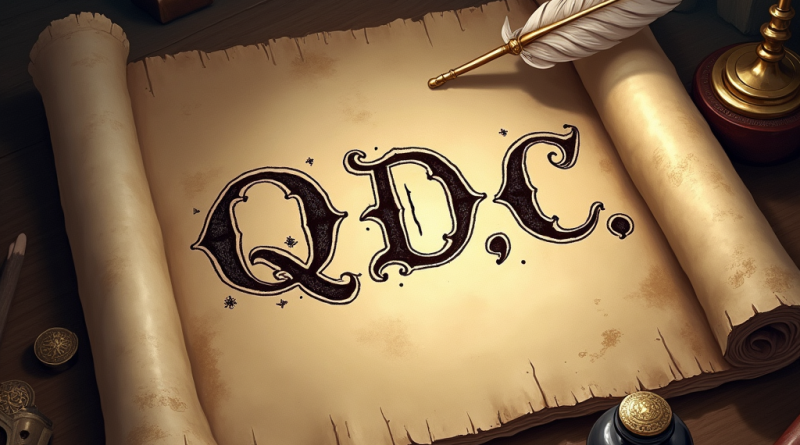Exploring Q.D.C. in Old English Abbreviations: History, Usage, and Significance
The abbreviation Q.D.C. in Old English and historical texts has intrigued scholars and enthusiasts of linguistics, as it is not as widely recognized as other traditional abbreviations. Understanding its roots and usage can provide insights into the language of past centuries, especially in legal, ecclesiastical, and academic contexts.
In this article, we’ll explore what Q.D.C. stands for in Old English abbreviations, how it was used, and the significance it carried in historical texts. Additionally, we’ll examine common questions and misconceptions surrounding this abbreviation, providing a comprehensive look into its relevance in Old English language and documentation.
What Does Q.D.C. Stand For?
The abbreviation Q.D.C. is derived from Latin, often seen in Old English and medieval manuscripts, especially in religious, legal, and scholarly writings. It stands for “quod deus concedat”, which translates to “which God grants” or “may God grant this” in English.
The phrase was commonly used in religious texts, blessings, and legal documents, where the writer would invoke divine approval or blessing upon a particular action, wish, or decree. Its usage was particularly prevalent in the Middle Ages, when Latin was widely used across Europe in official and ecclesiastical documents.
Historical Context of Q.D.C.
Latin abbreviations like Q.D.C. were frequently employed in medieval England, where Latin served as the lingua franca for scholarly, religious, and legal matters. Many Old English texts contain Latin phrases and abbreviations, as Latin was the language of the educated elite and the church during this time.
1. Ecclesiastical Usage
In religious contexts, Q.D.C. was often found in prayers, blessings, or when invoking divine favor. Clergy and monks, who were among the few literate individuals in medieval times, would use phrases like quod deus concedat in written works to express a wish or plea for divine intervention or approval.
2. Legal Documents
In legal documents, particularly charters or deeds, Q.D.C. could appear at the end of a contract or agreement. This usage was a way of seeking divine blessing on the agreement, reinforcing the sanctity of the contract. In a time where religious authority played a significant role in governance and societal order, invoking God’s approval was considered essential.
3. Scholarly and Academic Texts
In academia, scholars would sometimes include Q.D.C. in the dedication of their work or within the body of the text as a way of humbly asking for divine support in their intellectual endeavors. The phrase served as a respectful acknowledgment of God’s role in granting wisdom and knowledge.
Examples of Q.D.C. in Old English Texts
To illustrate how Q.D.C. was used in Old English texts, here are a few examples of its application:
- Religious Text: In a prayer manuscript, a scribe might write: “Domine, custodi nos in pace, Q.D.C.” — meaning “Lord, keep us in peace, may God grant this.”
- Legal Document: In a medieval land deed, it could state: “Hoc testamentum signatum est Q.D.C.” — translating to “This will is signed, may God grant this.”
- Scholarly Work: In a dedication at the end of an academic treatise, a scholar might conclude with: “Opus completum est Q.D.C.” — meaning “The work is completed, may God grant this.”
The Role of Latin in Old English
It’s important to note that while Q.D.C. itself is a Latin phrase, its presence in Old English texts highlights the significant role Latin played in England during the early medieval period. Latin was the primary written language for formal and official documents, even as Old English developed as the spoken language of the time.
Latin abbreviations like Q.D.C. allowed for brevity in writing, which was essential when producing manuscripts by hand. Additionally, the use of religious or divine invocations was common across various kinds of writing, reflecting the deeply religious nature of medieval society.
Decline of Q.D.C. Usage
By the late Middle Ages and the Renaissance, the use of Q.D.C. and similar Latin abbreviations began to decline, as English gradually replaced Latin as the dominant language in legal, scholarly, and ecclesiastical texts in England. The Protestant Reformation and the rise of vernacular languages further diminished the need for Latin in everyday affairs.
While Latin continues to hold significance in the Catholic Church and academic institutions, abbreviations like Q.D.C. are largely relegated to historical study rather than active usage.
Common Misconceptions About Q.D.C.
Given the obscure nature of Q.D.C., there are some common misconceptions about its meaning and usage:
1. It Is Not an English Abbreviation
Some might mistakenly believe that Q.D.C. is an abbreviation from the English language due to its presence in Old English manuscripts. However, it is important to remember that Q.D.C. is a Latin abbreviation and reflects the widespread use of Latin in English-speaking countries during the medieval period.
2. It Is Not Exclusively Religious
While Q.D.C. was frequently used in religious texts, it was not limited to ecclesiastical documents. Its use extended to legal, academic, and even personal writings, where the writer sought divine approval or blessing.
3. It Is Not Commonly Used Today
Though Q.D.C. was once widespread, it is no longer a common abbreviation. Its usage today is primarily found in historical texts and in academic study of medieval manuscripts. Modern legal and religious documents do not employ the phrase in the same way.
Conclusion
Q.D.C. stands for quod deus concedat, an abbreviation that holds significant historical relevance in Old English texts and medieval manuscripts. As a reflection of medieval society’s deep religious roots, the phrase invoked divine favor and blessing in various contexts, from legal agreements to scholarly works.
While its usage has declined over the centuries, Q.D.C. remains an important part of the linguistic history of England and serves as a window into the world of medieval thought and communication.
Frequently Asked Questions (FAQs)
1. What does Q.D.C. stand for?
Q.D.C. stands for “quod deus concedat,” which translates to “which God grants” or “may God grant this” in English. It was commonly used in medieval Latin texts.
2. Where was Q.D.C. used?
Q.D.C. was used in religious, legal, and scholarly texts during the medieval period. It was particularly common in documents that sought divine approval, such as contracts, prayers, and academic dedications.
3. Is Q.D.C. an English abbreviation?
No, Q.D.C. is not an English abbreviation. It is derived from Latin and was used in Old English manuscripts, reflecting the use of Latin in medieval England.
4. Is Q.D.C. still used today?
The abbreviation Q.D.C. is not commonly used today. It is primarily of historical interest, found in the study of medieval manuscripts and texts.
5. Was Q.D.C. used only in religious contexts?
No, while Q.D.C. was often found in religious contexts, it was also used in legal and academic writings, especially when invoking divine approval for agreements or scholarly work.
6. Why did people use Q.D.C. in medieval times?
People used Q.D.C. to invoke God’s favor or approval in various matters, such as legal agreements, prayers, and scholarly works, reflecting the importance of religion in medieval society.
7. When did the use of Q.D.C. decline?
The use of Q.D.C. and similar Latin abbreviations declined in the late Middle Ages as English replaced Latin as the primary language in legal, ecclesiastical, and academic texts.




